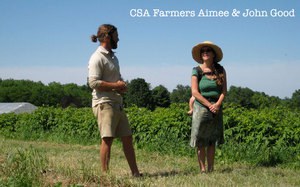Highlights from the day include a CSA farm tour; box of bumblebees in the NRCS cost-share high tunnel; Rodale's no-till roller-crimper and Rodale's online organics course.
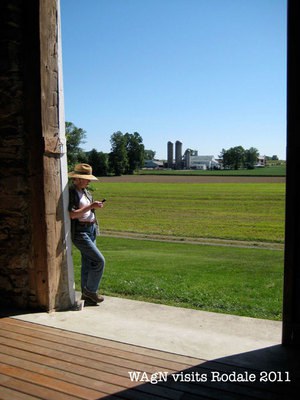 The sun was shining for our annual visit to Rodale Institute in Kutztown, PA. WAgN members and friends gathered for a full day of touring and exploring this internationally known organic research center- "the birthplace of organics in North America."
The sun was shining for our annual visit to Rodale Institute in Kutztown, PA. WAgN members and friends gathered for a full day of touring and exploring this internationally known organic research center- "the birthplace of organics in North America."
If you haven't been to Rodale yet, do plan a visit! Their work is inspiring; the staff is incredibly knowledgeable and willing to share that knowledge with you in a way that can be applied to your situation. Whether you're running a large dairy or small kitchen garden, you will come away from your visit armed with info that you can use to produce more food, more sustainably.
Quiet Creek Farm CSA: Feed the staff and buy a box of bees!
CSA farmers Aimee and John Good help feed over 200 families on eight acres leased from Rodale. We started our field tour with a walk through their U-Pick gardens where strawberries were ready for harvest. John explained how members really enjoy coming out to the farm to pick berries and cut flowers. They also love having a one-stop food shop housed in a beautiful historic stone barn.
By stocking their on-farm pick up site as a store with other local farmers' products including dairy, flour and meat, John and Aimee are providing their members with a grocery solution many of us dream about. It's not just the members who enjoy the ease of getting most or all of their food from local high quality organic suppliers in one small store, staff love it too. The Goods provide their staff with store credit every month; John says you shouldn't underestimate the value of keeping your help happy!
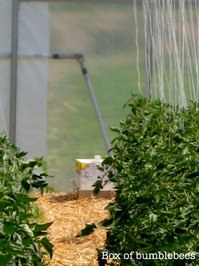 On our tour of the CSA gardens we got a good look at their new high tunnel (hoop house) from Atlas Greenhouses. John and Aimee bought the tunnel with the help of an NRCS grant. John says having the ability to role up a half-wall on either side and a roll up door that allows a tractor through is a benefit that a traditional green or hoop house wouldn't afford. But his tomatoes still need attention from pollinators that aren't too abundant in the enclosure. Their solution? Buy a box of bees! One small box of bees has pollinated their tomato crop with ease. The Good's recommend the supplier they used: Crop King, but the bumblebee boxes can be purchased at a number of other supply houses. John says that when he got the box he thought there weren't enough bees but the workers proved him wrong.
On our tour of the CSA gardens we got a good look at their new high tunnel (hoop house) from Atlas Greenhouses. John and Aimee bought the tunnel with the help of an NRCS grant. John says having the ability to role up a half-wall on either side and a roll up door that allows a tractor through is a benefit that a traditional green or hoop house wouldn't afford. But his tomatoes still need attention from pollinators that aren't too abundant in the enclosure. Their solution? Buy a box of bees! One small box of bees has pollinated their tomato crop with ease. The Good's recommend the supplier they used: Crop King, but the bumblebee boxes can be purchased at a number of other supply houses. John says that when he got the box he thought there weren't enough bees but the workers proved him wrong.
Here's a short video about the USDA NRCS high tunnel cost sharing program:
Rodale History and Organic Online Course
Before lunch, we cruised through the fields on a wagon tour enjoying the scenes and learning a bit about the history of Rodale from our fearless tour leader Maria Pop. Why did Rodale, a successful NY business tycoon in the 1940s become an organic pioneer? A heart scare and the will to do things differently! J.R. Rodale was told by his doctor his heart was a ticking time bomb, his response was to get out to the country, change his diet and his lifestyle. He reaped the benefits, outliving his doctor and becoming an (almost) household name for both his publishing company and his organic agriculture research.
The research farm we visited in Kutztown has been continually operated as such since the 1970s.The 300 plus acres are currently worked by just four full time 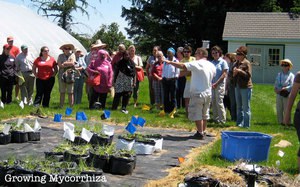 employees with a handful of seasonal staff. We saw the 30-year ongoing farming systems trial, mycorrhiza growing trials, the large-sale compost facilities and trials, animal pasturing for closed-loop production and a bit more. The results of Rodale's many organic field trials are published in scholarly journals, shared via the New Farm website-magazine and enthusiastically shared with all who visit the farm or check out their website.
employees with a handful of seasonal staff. We saw the 30-year ongoing farming systems trial, mycorrhiza growing trials, the large-sale compost facilities and trials, animal pasturing for closed-loop production and a bit more. The results of Rodale's many organic field trials are published in scholarly journals, shared via the New Farm website-magazine and enthusiastically shared with all who visit the farm or check out their website.
Later in the afternoon, head farmer Jeff Moyer (who has also chaired the USDA national Organic Standards Board in the past), introduced us to Rodale's "transition to Organics" online course. This is a GREAT resource for anyone interested in organic farming and particularly for those who which to transition a conventional operation to organic. There is a calculator to help figure the financial balance of transitioning (over the next six years), there is a farm planning tool and a course designed to introduce you to soils, USDA standards and moving through the transition process. Many of the features are tailored to your particular farm (form info you enter) and can be saved for use year after year.
The Roller-Crimper
We got pretty excited about organic no-till agriculture. Agronomist, Christine Zeigler Ulsh explained the no-till trial Rodale is pioneering with a grant from the USDA. She emphasized that organic no-till is not completely no-till since the fields still require cutting and disking in the fall, but in the growing season, the no-till system cuts field operations from 8-10 down to ONE (the Roller-crimper-planter pass)!
The cover crop, in this case flowering hairy vetch that was sown the previous fall, is rolled down and crimped by an implement - the roller-crimper- on the front of the 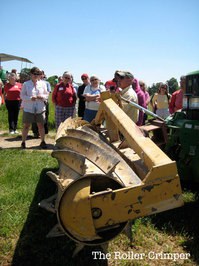 tractor creating a nutrient rich compost mat that seeds are then planted straight into by the precision seeder on the back of the tractor. One sweep over the field and the crop is planted, protected from weed competition and fertilized for the season. At the end of the season, the all plant matter is tilled, improving the soil for the following year. When compared to the commonly used plastic mulches, this method has considerable cost and labor savings. The ecological benefits are numerous, including building soil health, reducing fossil fuel use and saving the landfill space that would have gone to the plastic sheeting!
tractor creating a nutrient rich compost mat that seeds are then planted straight into by the precision seeder on the back of the tractor. One sweep over the field and the crop is planted, protected from weed competition and fertilized for the season. At the end of the season, the all plant matter is tilled, improving the soil for the following year. When compared to the commonly used plastic mulches, this method has considerable cost and labor savings. The ecological benefits are numerous, including building soil health, reducing fossil fuel use and saving the landfill space that would have gone to the plastic sheeting!
The 'Roller-Crimper' was designed by farmers at Rodale and the plans are freely available online. It is being manufactured but you can also make it yourself. It can be scaled to any size planting and farmers across the country are having great success with this organic no-till method.
Want to try it on your farm? Build your own with these plans: Rodale Roller-Crimper Plans (pdf)
Pennsylvania Women's Agricultural Network
Address
302 Armsby BuildingUniversity Park, PA 16802
- Email pawagn@psu.edu
Pennsylvania Women's Agricultural Network
Address
302 Armsby BuildingUniversity Park, PA 16802
- Email pawagn@psu.edu

